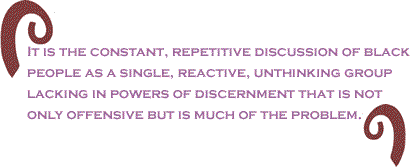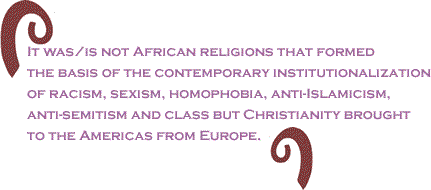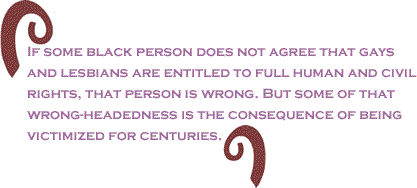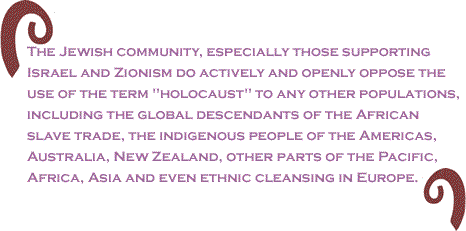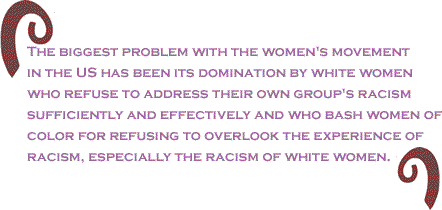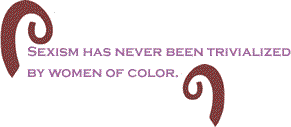
|
|||||||||||||||||||||||
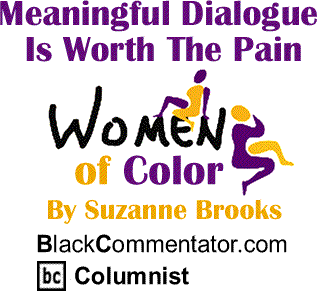
|
|

Custom Search
|
|
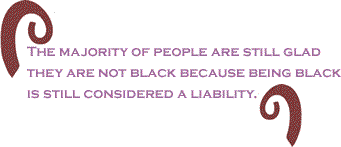 |
|
The following is a dialogue between two women, white and black, both writers, in different parts of the country, who “met” through an online grassroots group supporting the election of Barack Obama. Through more than a year of dialogue, often intense, each has been willing to put real thoughts out front to the other, mindful of the pain which can result, but having faith in the integrity of the other and sharing key goals and visions for the nation. Until and unless more people take such risks and have these conversations, solutions offered for racism, sexism, homophobia and other ‘isms will be superficial, symbolic and solve nothing. The names are invented to keep the focus on the dialogue alone. Jean: I have mixed feelings about using the word "slavery". Tina: I am not clear on what the mixed feelings are. Slavery has existed throughout history and in most of the world and certainly many kinds of people have been enslaved. I don't understand when people respond to issues by asserting that they are constrained by what black people think. Obviously, the majority of the US population are not in fact constrained by what black people think or black people would be in better circumstances than they.We are and would surely be in at least equitable circumstances as those claiming the constraints. Jean: No doubt some (many? all?) African-Americans would be highly OFFENDED by that. Tina: Why is it necessary to react to black people based on percentages? No other group gets this kind of treatment. It has the effect of blaming the victim. In other words, "we" would be more supportive of black people if "we" knew what they want or if "black people knew what they want" or " if black people were all in agreement on what 'they' want 'us' to do for them" or "black people are so easily offended" or "when black people are offended, they are a threat/violent, etc" or " the problem with black people is that they don't just get offended, they get highly offended" or " when black people get highly offended they are a threat to others/society/the nation/the world" or "before we can discuss racism, we must make sure we do not offend black people because there are scary consequences to offending 'them" ''. I could go on but you get the drift of this. This kind of thinking and approach to us is rooted in notions that black people are irrational, unthinking, insane, unreasonable, violent, scary, unpredictable people who understand little and cannot be understood without a lot of advance questioning and research. It is this way of beginning discussions with us that is so irritating. It is also rooted in the notion that there is one kind of black people who all think alike or should think alike if they want to be understood and accepted by the rest of US society. And notwithstanding Obama's coming presidency, being black is still considered the worst racial/ethnic group to be, even with the scientific proof that all people on earth are African. The majority of people are still glad they are not black because being black is still considered a liability. And, as Obama also demonstrates, despite attention to his multi-racial (for the sake of argument assuming race exists, which it does not) heritage, he is still really considered black because it is still a fact that "one drop of black blood" make a person black. This is not true of any other ethnic combinations in this totally negative way. Being black is not viewed as positive, in the sense of being an advantage, by any other groups.
Jean: Why do I say that? Just look at how "insulted" many Black people are when Gay & Lesbian people talk about their rights to not be discriminated against or to the legal marriage equality (NOT talking about what churches do--but, the LAW) as "civil rights". Tina: First of all, there are many black gay and lesbian people so posing this argument in terms of black versus gay/lesbian is one of the many divisive, scapegoating strategies in play. Yes, there are black people, especially among certain "Christian" groups who view homosexuality as a choice and not as an orientation from birth. In part, this is the consequence of the failure of the society to provide black people with an equitable education. Many don't have all the facts. Secondly, blacks are still a small minority in the US, lacking the power to alone determine the outcome of civil rights for themselves/ourselves or any other group. So why is there such a focus on how blacks feel about this and no comparable discussion to the way whites--who are the ultimate deciders of the outcome on this and all issues of civil and human rights in the US--not subjected to the same kinds of discussion? Thirdly, there are many black people and people of other groups whose oppression continues unabated in this country. In such circumstances, people do not wish to turn attention from ending the oppression they see as foremost in their lives to addressing oppression which (rightly or wrongly) will address the concerns of a smaller group on a different basis and thus deflect attention and reduce the effort to end racism. The tragedy in this is how quickly the majority group spins into action to denounce victims of oppression when objections are raised about reductions in attention to the oppression they experience. Those benefiting from racist oppression are thus able to see themselves as having a purer vision of fairness and to sit in judgment of those at the bottom of the society where issues of race are concerned. Jean: It's as if ONLY Black people have a right to the term "civil rights"...having been quite literally enslaved for almost 300 years, I'm sure many would feel much the same abut the term slavery. I think the labor movement's use of the term "wage slavery" was considered offensive. Tina: It is the constant, repetitive discussion of black people as a single, reactive, unthinking group lacking in powers of discernment that is not only offensive but is much of the problem. Underlying this kind of thinking is the denigration of black people who communicate in any manner deemed "offensive, uncomfortable, inappropriate, unjustifiable, too assertive, lacking in humility" and all the other qualifiers that are directed at black people in order to be worthy of having their concerns addressed. Just as black men, in the time of Emmett Till (and before and after) were forbidden to look white men in the eyes without being considered disrespectful, black people are still bombarded with these kinds of "requirements". So recently, someone suggested that women of color might be more accepted if we acted more like Rosa Parks than like supporters of Malcolm X and Angela Davis. The fact that the word ONLY is in caps when negatively describing black people and civil rights suggests that we should be less insistent on civil rights for black people--which have yet to be achieved. It is not black people who are responsible for and are benefiting from the institutionalized forms of oppression in this country. It was/is not African religions that formed the basis of the contemporary institutionalization of racism, sexism, homophobia, anti-Islamicism, anti-semitism and class but Christianity brought to the Americas from Europe. But there are no widespread, substantive discussions of this anywhere. And for the record, there were African slaves in Jamestown in 1607, making it 400 years. I am also troubled by the sweeping generalizations made about black people. If some black person does not agree that gays and lesbians are entitled to full human and civil rights, that person is wrong. But some of that wrong-headedness is the consequence of being victimized for centuries. It is certainly not true that all black people feel that way. But where is the outrage specifically against white people on this issue. There is none. The issue is discussed as black people versus gay/lesbian people and about people who are homophobic. My point is the white people are not examined in the same way on these issues and are not held to the same standards of accountability. It is also a fact that the overwhelming majority of those who benefit from all forms of oppression in this country are white. This is never discussed in these terms either. Yet, there are always white people sit in this kind of judgment of the victims of racism.
It should also be noted, that the Jewish community, especially those supporting Israel and Zionism do actively and openly oppose the use of the term "holocaust" to any other populations, including the global descendants of the African slave trade, the indigenous people of the Americas, Australia, New Zealand, other parts of the Pacific, Africa, Asia and even ethnic cleansing in Europe. Try contacting the Holocaust Museum in the US and you will get a vehement response against collaborating on presentations associated to all the holocausts experienced by the people of the world. This is a well known fact, yet no one addresses it and the fact that Israel is carrying out the holocaust of the Palestinians. It is unfortunate that this issue goes un-addressed. It seems reasonable to examine the impact of the horrific experience of the Jews at the hands of the Nazis with some understanding of the many kinds of destructiveness that resulted, including perhaps their own insensitivity to the needs of other groups and difficulty in grasping that their group is not the only one to suffer to such an extent and that there is nothing to be gained by trying to measure/define whose holocaust was worst. It is because these conversations do not take place that countries and communities continue on destructive paths which not only hurt others but themselves. Jean: But, of course, women (of ALL colors) are the PRIMARY people who are EXPECTED to provide FREE LABOR. Tina: While it is true that all women, including white women suffer sex discrimination and are economically below the men of US society, it is equally true that white women do not suffer from racism and that women of color are below white women economically and in every measurable socio-economic status in the US. This also means that while white women suffer from sexism, they do derive some benefits from racism. The biggest problem with the women's movement in the US has been its domination by white women who refuse to address their own group's racism sufficiently and effectively and who bash women of color for refusing to overlook the experience of racism, especially the racism of white women. Of course, this is not to say that all white women are willfully racist. There are, thankfully, many white women who are confronting the racism of their white sisters and who are in solidarity with women of color in opposing all forms of oppression, including racism and homophobia as much as sexism. And this is primarily a battle that must be waged by white women with other white women. It is not the responsibility of women of color since we are not subjecting white women to racism--though there are those who attempt to suggest the contrary. Women of color are on the bottom of society. Let me repeat that: Women of color are on the bottom of US society, below the status and benefits enjoyed by white women. Until white women are willing to relinquish privileges of whiteness, there can be no real and lasting sisterhood among women. Women of color have no privileges of race or gender to relinquish. The same analogy applies to men of color who must relinquish the privileges of male gender to establish real and lasting community and relationships with women of color. Jean: Wish I had a source for this factoid but, it's said that women provide 70% of the world's labor but, get only 10% of the world's wages * only own 1% of the world's property--a result of BOTH being UNDER-paid & NOT paid at all for the work we do. Tina: White means of European origin in discussions such as this one. Europeans and European Americans are an overwhelming minority in the world. Thus, the 70% of the world's labor who get 10% of the wages and 1% of the property are mostly not of European origin. The statistic I found indicated that only 7.3% are European/European American. That means 92.7% of those women are women of color. While I don't think any women should be in this situation, surely the magnitude and duration of these problems for women of color engulfs the situation for our European/European American sisters. Jean: I think this goes to the heart of WHY white women's rights movements have always paralleled the Black liberation movements (19th century abolition & post-1960s cvil rights movement). Tina: These movements are failures for women of color for whom justice is still a hope for justice since we continue to be where we have always been at the absolute bottom with little empathy from those who may suffer racism or sexism singly but are generally resentful when women of color raise the issue of how much worse it is to experience both racism and sexism. Instead of embracing us and collaborating with us, we are met with additional opposition and denials from those who benefit from racism or sexism singly, while white males benefit from both. Jean: It seems like most people have no idea that while white (& all other) women were not literally bought & sold as Black people were, women were considered "chattel"--that is, property of first, fathers, & then, husbands, w/no rights to own property or their own wages or even to have custody of their children--who also 'belonged" to fathers. Tina: I can't speak for "most people" if most people includes white males, white females and men of color. As for women of color for whom I have been one of many advocates through the years, we understand the sexism experienced by white women because we experience that too, exactly as you have described it. We also understand the racism experienced by men of color because we experience that too. However, with notable exceptions among white women and men of color, these two groups are unwilling to deal with the intersection of racism and sexism, refuse to consider that living under both is worse than living under one of them, and convince themselves that women of color do not understand or suffer oppression based on race or sex. This is a ludicrous notion. We experience both. We are the only people who experience both. Instead of supporting us across the board, we are constantly criticized as if we don't understand the social movements which left us out. Including the women's suffrage movement, none of the movements by white women have equitably addressed racism. Even the current call for Obama to put a Presidential commission on women in place excludes us. I have discussed this with leaders of Women Count who responded pleasantly but have not carried out a single promise to include women of color and to specifically address and begin with the intersection of racism and sexism. Their indication of a willingness to begin by raising the status of the women on the bottom of US society--women of color--still awaits changes in their material being sent out daily across the country. Of course, they use a few photos of women of color in the usual strategy to give us symbols but not substance. There has been no women's movement in the US which has addressed the status of women of color and been willing to act on it so that we are not perpetually on the bottom. Nor did the civil rights movement address the needs and concerns of women of color specifically. We are always glossed over, assumed to be included without ever mentioning us.
Jean: While some of these issues began to change in the late 19th/early 20th century--there were many reasons the 1960s (actually 1970s) women's movement needed to come into being. This may anger you, but, one of my pet peeves in the last few years has been the TRIVIALIZATION/minimizing of sexism. Tina: This is an absurdity. Sexism has never been trivialized by women of color. If it has been trivialized by men of any color or by white women, then your peeve should be directed at them. Sexism affects women of color in exactly the same way as white women. There are a plethora of women of color writers and scholars who have addressed this. Yet, only when white women address it, I guess, is it recognized. Read Mad At Miles by Pearl Cleage, read bell hooks, read Alice Walker, Michele Wallace. Read the work of Carine Mardorossian who specializes in postcolonial and feminist studies and is the author of the "Reclaiming Difference: Caribbean Women Rewrite Postcolonialism" (University of Virginia Press, 2005), which examines post colonialism through the eyes of Caribbean women writers. She is the author of the study, "Laboring Women, Coaching Men: Masculinity and Childbirth Education in the Contemporary United States." Her articles have appeared in the journals Gender Studies, Signs: Journal of Women in Culture and Society , College Literature, Hypatia and Callaloo. Also there is Beatriz Badikian-Gartler - I HEAR YOU SISTER: Women of Color
Speak (to Each Other), This Bridge Called My
Back first published in 1981 but still a classic on
feminist philosophy; the work of Barbara Smith and Kitchen Table
Press; Woman Artist Guerilla Girls Fight Sexism; and
myriad others. Don't forget that women of color have the least support
in getting published too. What is demanded by so many white women
is that women of color stop mentioning racism. There has never been
an overwhelming issue to us that sexism is not occurring. How could
it? We experience sexism as virulently as white women. Indeed many
of the legal cases won against sexism have been won by women of
color--a fact that is ignored by many white feminists. In the most
recent presidential election season, there was no call to white
women by women of color that white women were traitors to our Jean: Racism is considered a REAL oppression but, somehow by=definition white women can't possibly have experienced any oppression(& all the oppressions suffered by women of color are due to racsim--not sexism or the sexism women of color experience is REALLY racism & has nothing to do w/them being women or with how women of ALL colors are viewed). Tina: I have no clue on this kind of thinking. It is certainly not representative of the thinking of women of color. It may be part of the rationalization of some white feminists whose goal is to join the old boys network in the power elite, rather than to advance all women. These concepts are not ours. Women of color do not and cannot impose racism on white women. What kind of racism could that be. Women of color are at the bottom of US society in every measurable term. Nor are we responsible for imposing racism and sexism on ourselves. It is ludicrous to suggest that those of us who earn the least in this society are somehow depriving white women who earn nearly 10% more than all women of color. What is needed is for white women to stop misdirecting their anger toward women of color who are not responsible for racism or sexism and who are the only victims of both kinds of oppression. The denial by so many white women of these facts is one of the factors which helps maintain the systems of oppression. No such condition exists for women of color. Like it or not, our hands are clean, so to speak. We are not part of the problem in the same sense. We are working on solutions.
Jean: I will never understand. Certainly a good check of why this is so is that the "official" women's movement of the 1970s was led by white, middle-class women (a la NOW--an organization I rejected as a 20 year old in the late 70s BECAUSE they were so clueless re: race, class & homophobia). Tina: There have always been women who supported the status quo because they benefited by birth, for example, by being part of the ruler class. So queens were never feminists, never advanced the causes of women. These women in the US have been white with very few exceptions. Jean: However, it's also true that communities of color have not wanted to address sexism, homophobia or class. Tina: This statement is in error because it lumps the victims of sexism and homophobia with the perpetrators--which is not done when discussing white people. Men of color may not want to address sexism. Women of color not only want to address it but have been addressing it substantively since slavery. But we have also had to fight white women as well as men to be recognized as women. This is what Sojourner Truth was addressing in her famous speech, "Ain't I A Woman" which was made to the assembled white women and black men at the suffragette convention. AIN'T I A WOMAN? by Sojourner Truth Delivered 1851 at the Women's Convention in Akron, Ohio Well, children, where there is so much racket there must be something out of kilter. I think that 'twixt the negroes of the South and the women at the North, all talking about rights, the white men will be in a fix pretty soon. But what's all this here talking about? That man over there says that women need to be helped into carriages, and lifted over ditches, and to have the best place everywhere. Nobody ever helps me into carriages, or over mud-puddles, or gives me any best place! And ain't I a woman? Look at me! Look at my arm! I have ploughed and planted, and gathered into barns, and no man could head me! And ain't I a woman? I could work as much and eat as much as a man - when I could get it - and bear the lash as well! And ain't I a woman? I have borne thirteen children, and seen most all sold off to slavery, and when I cried out with my mother's grief, none but Jesus heard me! And ain't I a woman? Then they talk about this thing in the head; what's this they call it? [member of audience whispers, "intellect"] That's it, honey. What's that got to do with women's rights or negroes' rights? If my cup won't hold but a pint, and yours holds a quart, wouldn't you be mean not to let me have my little half measure full?
Then that little man in black there, he says women can't have as much rights as men, 'cause Christ wasn't a woman! Where did your Christ come from? Where did your Christ come from? From God and a woman! Man had nothing to do with Him. If the first woman God ever made was strong enough to turn the world upside down all alone, these women together ought to be able to turn it back , and get it right side up again! And now they is asking to do it, the men better let them. Obliged to you for hearing me, and now old Sojourner ain't got nothing more to say. Tina: Of course, Sojourner Truth had to make a ruckus at the door to be admitted and to speak. The black male and white female abolitionists who had come together to develop a strategy for women's suffrage did not plan to include black women or other women of color. This is the history which white women and men of color must face, acknowledge and address instead of looking to find fault and blame women of color without justification. Women of color, as the most powerless members of the country throughout its existence cannot be responsible for the institutional racism and sexism of which we alone experience both. Jean: But, at 50,I am weary (& frankly, impatient) about having my own reality ERASED. I've heard Black men sneer that violence against women is "just the way it is"--but, they'd NEVER accept that claim about police brutality directed at men of color. Tina: But why do you hold women of color accountable for this? We are not the perpetrators of this. Jean: As someone who’s worked on police brutality for 30 years AND who's survived both domestic violence & rape, I find that position very hard to accept. Tina: Then direct your concerns about this to those who are responsible. Women of color are also victims of domestic violence and rape--at higher levels than women of color. So why keep reminding us of this as if it is our fault and ignoring that we experience it too. We don't throw in the face of white women that we face higher incidence of violence and rape--though it is true. We don't understand why this keeps coming up as if we are untouched by domestic violence and rape and as if we are responsible for what happens to white women. In addition, there is the refusal to acknowledge the groundbreaking work women of color have done in these areas. Why so much anger at us? This is what needs to be honestly examined. I think it is rooted in guilt feelings that are also not caused by us but need to be resolved by those who experience them. Jean: Ignoring the oppression of others (sexism against women of whatever color, glbt people etc) will NOT bring racism/white supremacy one inch closer to an end. Tina: Women of color are not ignoring the oppression of others. We are among those most oppressed in every category of oppression. We are the most oppressed by racism, sexism, homophobia, age, disability, religion and class. We are the ones who need every kind of oppression eliminated. We are the only ones who derive no benefit from any kind of oppression. That is the fact that all other groups must come out of denial and see. Otherwise, such people are part of the problem in defending the kind of oppression they impose on us, because we get it all. Jean: Justice is NOT a zero-sum game--where if one group gets more justice, another group gets less. Tina: I don't know how many ways it is necessary to say it. Women of color are just as much women as white women. Whatever white women suffer, so do women of color. IN ADDITION, we suffer things white women do not experience. There is no kind of oppression experienced by white women that is not experienced more virulently and more extensively by women of color. Logically, one would think this would cause white women to be more supportive of women of color rather than treat us as if we are not women and as if we ignore sexism. This is as clear a case of scapegoating as can be imagined.
Jean: Empathy for other's oppression born out of one's own experience is something to aspire to for ALL of us. Tina: What "other" oppression is experienced by white women that is not experienced by women of color? We don't need to feel "empathy" for the oppression of white women, we experience the exact same kind of oppression. Why do some white women insist that we are not women or that we do not experience sexism or that we don't oppose sexism when none of this is true? This is a problem, but it is not the problem of women of color. And in spite of all that has been discussed here, women of color continue to reach out to white women and try to establish lines of communication to end oppression for us all, even while so many of our white sisters continue to push us away. Jean: In solidarity Tina: I claim you as my woman-friend with whom I am committed to work to end the oppression of all people, not just all women or all men or all whatever. Women of color are not compartments of womanness and color and gender orientation that can be divided up and worked on separately. We are all of this at once. We cannot be free in one part and enslaved in another. I will keep saying this. Hopefully, some day it will become clear. BlackCommentator.com Guest Commentator Suzanne Brooks is the founder and CEO of International Association for Women of Color Day and CEO of Justice 4 All Includes Women of Color. Click here to contact Ms. Brooks. |
|
Any BlackCommentator.com article may be re-printed so long as it is re-printed in its entirety and full credit given to the author and www.BlackCommentator.com. If the re-print is on the Internet we additionally request a link back to the original piece on our Website. Your comments are always welcome. eMail re-print notice
If you send us an eMail message we may publish all or part of it, unless you tell us it is not for publication. You may also request that we withhold your name. Thank you very much for your readership. |
|
| |
|
| December 18, 2008 Issue 304 |
|
| Executive Editor: Bill Fletcher, Jr. |
| Managing Editor: Nancy Littlefield |
| Publisher: Peter Gamble |
| Est. April 5, 2002 |
Printer Friendly Version
in resizeable plain
text format or pdf
format. |
| Frequently Asked Questions |
 |

|
 |
 |
 |
| |
| |






























